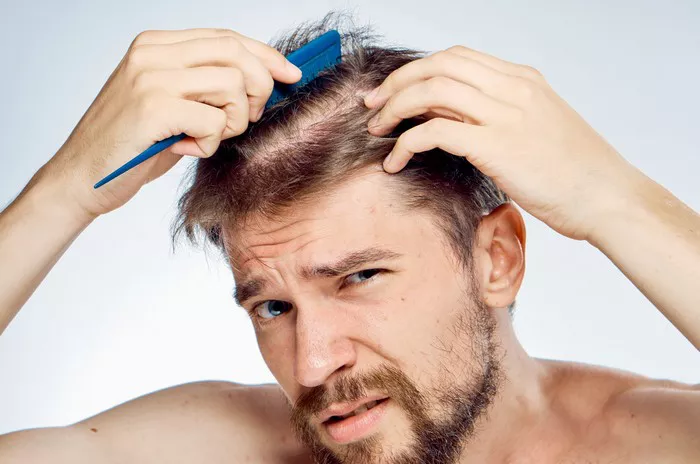Hairfall, often a cause for concern, can be attributed to various factors, with dandruff being a common culprit. The connection between dandruff and hair loss raises a crucial question: Is hairfall due to dandruff reversible? In this comprehensive guide, we will explore the relationship between dandruff and hair loss, debunk myths, and provide actionable insights for addressing and potentially reversing hairfall caused by dandruff.
1. Understanding the Dandruff-Hairfall Link
To comprehend the potential reversal of hairfall caused by dandruff, it’s essential to first understand the dynamics of this connection. Dandruff, characterized by the shedding of dead skin cells from the scalp, can indirectly contribute to hair loss through various mechanisms.
a. Inflammation and Irritation
Dandruff often leads to inflammation and irritation of the scalp, creating an unfavorable environment for healthy hair growth. This can weaken the hair follicles and contribute to increased shedding.
b. Fungal Overgrowth
The presence of the yeast-like fungus Malassezia on the scalp is a common factor in dandruff. This fungus can disrupt the natural balance of the scalp, potentially leading to hair loss.
c. Excessive Scratching
Persistent itching due to dandruff can result in excessive scratching, causing damage to the hair shafts and leading to increased breakage and hairfall.
2. Debunking Myths: Separating Fact from Fiction
Before delving into the potential reversal of hairfall, it’s crucial to address common myths surrounding dandruff and hair loss. Dispelling misinformation is key to developing an accurate understanding of the issue.
a. Dandruff Causes Permanent Hair Loss
Contrary to popular belief, dandruff itself does not directly cause permanent hair loss. However, the associated inflammation and irritation can contribute to conditions that may lead to hairfall if left untreated.
b. All Dandruff is the Same
Dandruff is a multifaceted issue with various causes, including dry scalp, oily scalp, and fungal overgrowth. Tailoring treatment to the specific type of dandruff is essential for effective management.
c. Treatment Equals Immediate Results
Addressing dandruff-related hairfall requires patience and consistency. Effective treatment may take time, and results can vary based on individual factors.
3. Reversing Hairfall: Practical Steps and Strategies
Now that we’ve established the connection between dandruff and hairfall, let’s explore actionable steps and strategies for potentially reversing hair loss associated with dandruff.
a. Choose the Right Anti-Dandruff Shampoo
Opt for anti-dandruff shampoos containing active ingredients such as ketoconazole, salicylic acid, or coal tar. These components target the root causes of dandruff, promoting a healthier scalp environment.
b. Consistent and Gentle Scalp Care
Consistency is key when it comes to scalp care. Avoid harsh hair treatments and excessive styling that may exacerbate dandruff and contribute to hairfall. Adopt a gentle hair care routine to minimize irritation.
c. Incorporate Natural Remedies
Supplement your anti-dandruff routine with natural remedies known for their soothing and anti-fungal properties. Tea tree oil, aloe vera, and apple cider vinegar are examples of natural ingredients that can complement your treatment.
d. Nutritional Support for Hair Health
Ensure your diet includes nutrients vital for hair health, such as vitamins A, C, and E, as well as biotin and omega-3 fatty acids. A well-nourished body is better equipped to combat the effects of dandruff on hair.
4. Consulting a Professional: When to Seek Expert Advice
While home remedies and over-the-counter products can be effective for mild cases, persistent dandruff and hairfall may warrant professional intervention. Knowing when to seek expert advice is crucial for effective and personalized treatment.
a. Persistent Symptoms
If dandruff and hairfall persist despite consistent at-home efforts, consulting a dermatologist or trichologist is advisable. They can conduct a thorough assessment to identify underlying causes.
b. Severe Inflammation or Infection
Severe cases of dandruff may lead to inflammation or infection. Professional guidance is essential to address these issues and prevent further complications.
c. Prescription Medications
In some instances, prescription-strength shampoos or medications may be necessary for effective treatment. These should be prescribed and monitored by a healthcare professional.
5. Tracking Progress and Maintaining Hair Health
Reversing hairfall caused by dandruff is a gradual process, and tracking progress is essential. Additionally, maintaining overall hair health is crucial for preventing future episodes of dandruff-related hair loss.
a. Regular Monitoring
Monitor the condition of your scalp and the extent of hairfall regularly. Documenting changes can help assess the effectiveness of your chosen treatments.
b. Adjusting the Routine
Be open to adjusting your hair care routine based on your progress. As your scalp health improves, you may need to fine-tune your approach for sustained results.
c. Holistic Approach to Hair Care
Adopt a holistic approach to hair care that includes stress management, proper hydration, and a healthy lifestyle. These factors contribute to overall well-being and positively impact hair health.
See Also: Understanding Hair Loss: Causes and Solutions
In conclusion
While the connection between dandruff and hairfall exists, the prospect of reversal is achievable with a targeted and consistent approach. By dispelling myths, understanding the underlying causes, and implementing practical strategies, individuals can navigate the journey toward a healthier scalp and hair. Whether through at-home remedies or professional guidance, addressing dandruff-related hairfall requires a personalized and patient approach for optimal results.


